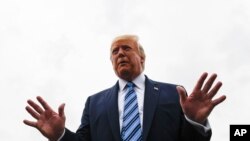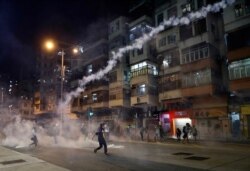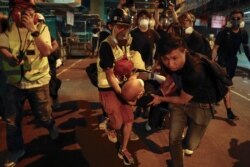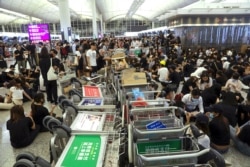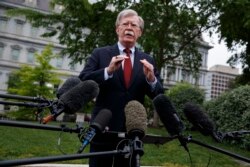Updated Aug 15, 12:58PM
State Department correspondent Cindy Saine and a reporter for VOA Cantonese contributed to this report.
U.S. President Donald Trump suggested Thursday that Chinese President Xi Jinping ought to meet personally with pro-democracy protesters in Hong Kong to resolve 10 weeks of demonstrations against Beijing's control of the semi-autonomous territory.
The U.S. leader, whose own motorcades often avoid driving past protests against him, said on Twitter that if Xi meets with the mostly youthful demonstrators "there would be a happy and enlightened ending to the Hong Kong problem. I have no doubt!"
Trump said, "I know President Xi of China very well. He is a great leader who very much has the respect of his people. He is also a good man in a 'tough business.' I have ZERO doubt that if President Xi wants to quickly and humanely solve the Hong Kong problem, he can do it. Personal meeting?"
The Chinese government has given no indication that Xi is planning to visit Hong Kong. Chinese security forces have been spotted conducting exercises in Mainland China, just across the border from Hong Kong, although there has been no troop movement toward Hong Kong.
China's ambassador to London, Liu Xiaoming, warned Thursday that Beijing will not "sit by and watch" the protests mount. The envoy said Beijing is ready to "quell the unrest swiftly" if the crisis in Hong Kong becomes "uncontrollable."
The U.S. and China, the world's two biggest economies, are in the midst of contentious, drawn-out trade negotiations. But Trump suggested any trade resolution can be delayed as long as the Hong Kong protests on the streets and this week at Hong Kong's international airport continue.
Trump went on Twitter late Wednesday to boast that his administration has the upper hand against Beijing in the trade negotiations. After writing that "thousands of companies" are leaving China, the president said, "Of course China wants to make a deal. Let them deal humanely with Hong Kong first!"
The president's tweets were his most extensive about the crisis in the Chinese territory since the demonstrations broke out. In remarks to reporters Tuesday, Trump, who last week took a hands-off stance on the protests, said the Hong Kong situation "is a very tough situation, very tough. We'll see what happens, but I'm sure it will work out." He expressed the hope that no one would get hurt and "for liberty."
The situation took an ominous turn Thursday, with reporters from both Reuters and AFP observing hundreds of members of China's People's Armed Police conducting exercises in a sports stadium in the southern city of Shenzhen, which sits across the border from Hong Kong. Dozens of trucks, armored personnel carriers and other military vehicles were spotted outside the stadium.
The deployment of the PAP forces confirms earlier reports published by Chinese state-run media claiming the forces was already assembling in Shenzhen.
A spokesperson for the U.S. State Department said Wednesday the United States is "deeply concerned" by reports of Chinese paramilitary movement along the border with Hong Kong.
"We encourage China and all parties in Hong Kong to pursue a solution that respects the liberty of Hong Kongers and Hong Kong's high degree of autonomy, as enshrined in the Sino-British Joint Declaration," a State Department spokesperson said. "It is important for the Hong Kong Government to respect the freedoms of speech and peaceful assembly, as enshrined in the Sino-British Joint Declaration, and for China to respect Hong Kong's high degree of autonomy."
On Wednesday, National Security Adviser John Bolton warned China to show restraint in its handling of the protests in Hong Kong.
"Something like 60% of the investment in mainland China goes through Hong Kong. Why? Because it has a judicial system that's trustworthy, based on the English model that we know in this country, the courts are thought to be impartial," Bolton told VOA Contributor Greta Van Susteren. "If Hong Kong loses that reputation because of a bad decision by the Chinese government, they'll have significant economic consequences in China this time, and I can tell you from what I've heard, just in the past few weeks, the mood in Congress is very volatile at this point, and a misstep by the Chinese government I think would cause an explosion on Capitol Hill."
He said China needs to learn from its past.
"The Chinese have to look very carefully at the steps they take because people in America remember Tiananmen Square," Bolton said. "They remember the picture of the man standing in front of the line of tanks, they remember the statue of Lady Liberty, they remember voices of the Chinese people asking for freedom and democracy, and they remember the repression of the Chinese government in 1989, it would be a big mistake to create a new memory like that in Hong Kong."
There have been fierce clashes between demonstrators and police on Hong Kong's streets. Violence also erupted at the international airport late Tuesday as riot police clashed with pro-democracy demonstrators who had taken over the airport for two straight days.
"We condemn violence and urge all sides to exercise restraint, but remain staunch in our support for freedom of expression and freedom of peaceful assembly in Hong Kong," the State Department spokesperson said.
Hong Kong residents have been protesting over their perceived erosion of freedom and lack of autonomy under Chinese control of the territory. The protests present the biggest challenge to Chinese rule of the semi-autonomous territory since its 1997 handover from Britain.




